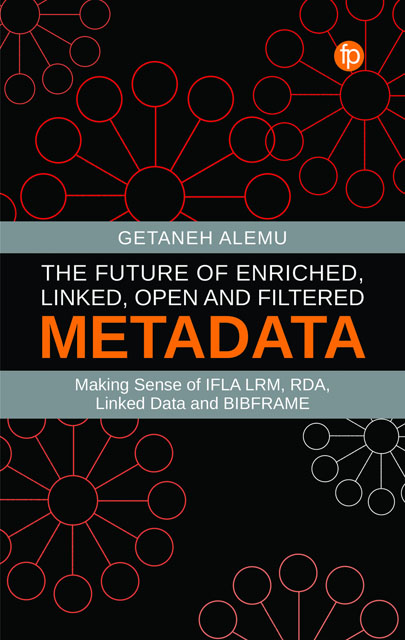 The Future of Enriched, Linked, Open and Filtered Metadata
The Future of Enriched, Linked, Open and Filtered Metadata Book contents
- Frontmatter
- Contents
- Figures
- Tables
- Code snippets
- About the Author
- Preface
- Acknowledgements
- Abbreviations
- 1 Introduction to Metadata
- 2 Metadata Strategies and Quality Indicators
- 3 Metadata Use Cases
- 4 Contemporary Metadata Principles
- 5 Enriched and Linked Metadata
- 6 Open Metadata
- 7 Filtered Metadata
- 8 FRBR, LRM and the Notion of Work
- 9 Resource Description and Access (RDA)
- 10 BIBFRAME: A New Metadata Framework
- 11 Crowdsourcing and User-Generated Metadata
- References
- Index
5 - Enriched and Linked Metadata
Published online by Cambridge University Press: 18 November 2022
- Frontmatter
- Contents
- Figures
- Tables
- Code snippets
- About the Author
- Preface
- Acknowledgements
- Abbreviations
- 1 Introduction to Metadata
- 2 Metadata Strategies and Quality Indicators
- 3 Metadata Use Cases
- 4 Contemporary Metadata Principles
- 5 Enriched and Linked Metadata
- 6 Open Metadata
- 7 Filtered Metadata
- 8 FRBR, LRM and the Notion of Work
- 9 Resource Description and Access (RDA)
- 10 BIBFRAME: A New Metadata Framework
- 11 Crowdsourcing and User-Generated Metadata
- References
- Index
Summary
Overview
In contrast to the principle of metadata simplicity andsufficiency, the principle of metadata enriching canbe considered a departure from traditionalcataloguing approaches, where the focus was onmetadata simplicity. Metadata created and managedfollowing the principle of enriching better respondsto users’ needs. Whilst the principle of enrichingresults in a potential abundance of metadata, theprinciple of filtering is used to simplify itspresentation by enabling a user-centred/focused/leddesign. Metadata enriching could be as simple asadding relevant keywords to a book's metadata recordto involve users in enhancing librarian-createdmetadata or as complex as combining and matchingmultiple ontologies to describe millions ofinformation objects. Enriching could be done bypeople or using complex algorithms and machinelearning techniques, or both. This chapter alsodiscusses Linked Data for library metadata.
The principle of metadata enriching
In contemporary metadata approaches, the librarian,archivist, or the metadata expert adds and maintainsthe metadata. The problem is that these expertsmight not anticipate the diverse interpretationsexhibited by users. The attempts to use controlledvocabularies solve only a part of the problem. Thereis an apparent disparity between controlledterminologies and terminologies used by users (Alemuand Stevens, 2015).
The principle of metadata enriching aims to address theabove limitations – mainly by involving severalactors and processes in the metadata creation,ingestion, enhancement and management. As Figure 5.1on the next page shows, metadata enriching andfiltering include various components, includinglinking, openness, platforms, technologies,applications and services.
The principle of metadata linking
An emergent concept in the library metadata landscapeis the principle of metadata linking. The notion oflinking and creating associations (such as see andsee also references) has always been there inlibrary metadata indexing, but the technologies toimplement scalable and granular linking have alwaysbeen limited. For example, Paul Otlet alreadyenvisioned linking between documents in the 1930sbefore the invention of computers and the web thoughmuch of his efforts were undone by the Nazis duringWorld War 2 (Wright, 2007; 2014). ‘Otlet argued forliberating information from the confines of books.’Other pioneers in the field include Vannevar Bush,Douglas Engelbart, Ted Nelson and Tim Berners-Lee(Wright, 2014).
Information
- Type
- Chapter
- Information
- The Future of Enriched, Linked, Open and Filtered MetadataMaking Sense of IFLA LRM, RDA, Linked Data andBIBFRAME, pp. 107 - 144Publisher: FacetPrint publication year: 2022